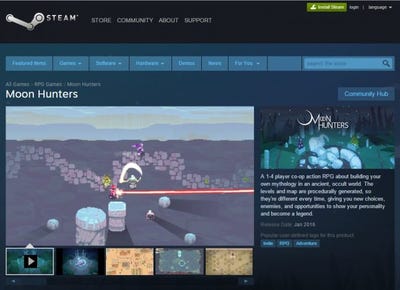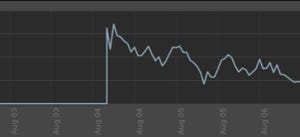
Featured Blog | This community-written post highlights the best of what the game industry has to offer. Read more like it on the Game Developer Blogs or learn how to Submit Your Own Blog Post
Learning From Mistakes: The Moon Hunters Launch
One indie team lead shares her lessons learned from mistakes made when launching her studio's biggest game, Moon Hunters, in 2016.

Tanya X. Short is the Captain of Kitfox Games, the independent Canadian studio behind Moon Hunters, Shrouded Isle, and the upcoming Boyfriend Dungeon.Tanya gave a live version of this article at the Game Developer's Conference 2018, as part of the Independent Summit.
It seems like most indies that you hear of err on the side of waiting too long to release their games. They extend their estimated launch by years and years, making sure everything is perfect. And if that's right for you, that's fine. If it works, it works! But some of us (including me) have the opposite problem -- we release our games too early, when they're still molten and unready and unfinished.
Luckily, now that I've not only been through it and learned from it, but also had time to heal and recover, I can share the warning signs with you. The Moon Hunters launch was 100% my call, and I blew it, so read on to find out if you might be in danger of making a similar mistake. Don't do it the way I did. Mess it up your own way.
The Setup
In early 2016, we were getting ready to ship our biggest game yet: Moon Hunters. We'd worked on it for over 2 years, which was already twice as long as our first game (Shattered Planet).

We'd done a lot of promotion through the years, in Montreal and abroad. We demo'd so many different versions of the game it's amusing to see the different iterations of the interface show up in old photos -- oh look, there's spring 2015, etc.

We published to the front page of various sites, including the PlayStation blog, multiple times. We showed at several PAXes in the Indie Megabooth, to packed crowds. We had articles from most major publications, and we had a Kickstarter that exceeded our expectations, blowing past our $45,000 goal up towards almost 400%. I'm still proud and grateful that we managed to have 6,000 backers.
Even more exciting, the game seemed to gain word of mouth pretty organically. The Kickstarter didn't have a mid-campaign slump, and we won awards at various events almost continuously. Everyone told me we had a hit on our hands -- for sure, we would be financially comfortable after the game came out. We had literally every reason to feel extremely good about what we'd built. That's what they said.

This was actually a bit later in the timeline, at the Canadian Video Game Awards, but just imagine this feeling of pre-launch cockiness and certainty.
In fact, we had built up so much visibility, that PBS Vermont sent a film crew around the time of our launch, to capture that fateful moment, and also to film our launch party. Lucky us.

The Launch Moment
Now, I'm a fiscally conservative studio head. We had stored up survival money, and I had lined up a profitable work-for-hire contract with a publisher we could start on afterwards, just in case things went completely awry. Financially, we could have waited a month or two to launch, but we didn't. We pressed the button just a bit too early.

And so the launch was... bad. Our fans were disappointed. There were crashes. The online multiplayer mode was in a 'beta' form, which was infuriating to most players. And there were core systems that were just unsatisfying and weird, which needed revisions.
Some mainstream audiences (like IGN commenters below) had already braced themselves to hate the game, which is theoretically easy to dismiss -- if someone doesn't like pixel art, they're not going to like Moon Hunters, sure. But I hate the idea that I added fuel to someone's anti-indie fire.

Consequences of Launching "Early"
So this is what a launch week looks like in a healthy game launch, like The Shrouded Isle -- those day 1 customers create word-of-mouth and positive reviews that spread to day 2 and day 3 etc.

The Shrouded Isle's launch week was thick-tailed.
Meanwhile, this is what Moon Hunters' game launch looked like (not healthy). All of our fans piled in on day 1, and then generated almost no word-of-mouth in days following. Our hype hit the brick wall of reality.

Moon Hunters launch week was... slender.
Now, theoretically, if that day 1 peak was very high, we could say that it was a perfectly healthy launch because we saturated our niche. But I can assure you that the peak was not that high.
Anyway, it's true that launch days don't determine everything about your sales, but it did influence our coverage and apparent success for the next 6-12 months. If we'd waited to launch until the game was ready, surely the Metacritic and user reviews would have been higher, and all of that would have led to higher spikes down the road, which all adds up to hundreds of thousands of lost dollars.

Thanks, PBS. You can watch the full episode of "Qulture" here. They were actually very kind.
And PBS was there to capture it. Lucky us. But they were just telling the truth -- we released an unready game and got what we deserved. Despite our launch day being better than many indies, we could tell the coming year wasn't going to be quite enough to sustain our 4-person studio.
I also immediately found myself massively demotivated. I didn't really care about the money. I had prepared for bad sales, and even lined up a gig for just after launch to sustain us, for this exact possibility. But I hadn't quite prepared my heart for disappointing people, or making what could be called a "bad game". I was heartbroken. I felt like I'd wasted years of my life, making something that wasn't worth the time or energy from me or my teammates. It made me feel like I had peaked, and that I was old, and tired.
Bad Omens
In hindsight (which has no bias at all, ahem), we should have known better. In fact, one prominent YouTuber went so far as to write me a heartfelt letter during the beta, pleading with me to delay the launch. But I ignored that, as his demands and wishes seemed unreasonable. I also ignored other signals, like this sincere Kickstarter backer:

But, as obvious as it seems now, it wasn't obvious then. I thought I was being smart. So why did I do it? If I really think back to that moment, there's a few factors that led to me making this mistake. So if any of this sounds familiar to you, take note. Your future self might not want you to do what you're about to do.
(Again, be warned that a moment of self-awareness can go a long way. I am a person that is particularly impatient and efficiency-/deadline-oriented. But if you're the opposite kind of indie developer/project lead, who tends to be particularly whimsical and quality-/perfection-oriented, you probably shouldn't read this stuff, as it might be reversed from the advice that applies to you. Take what you need; pass on the rest.)
Reasons why we launched too early:
I wanted to prove naysayers wrong. Indies go around saying to double or triple or quadruple task estimates, and it annoys me because project management is an art. So when everyone told me we'd keep delaying, I got a bit defiant. I wanted to prove it was TOTALLY POSSIBLE to launch on schedule. And uh, so, it is totally probably possible, but don't get obsessed with your schedule in order to do it.. sacrificing your project on the altar of "I told you so" isn't worth it.
I was proud of my production skills. Pride goeth before a fall. I started to feel like even minor delays (a day, a week) was a personal wound on my honor. I felt like I was a failure and a fraud. I felt like I "couldn't" delay again. I was wrong. I totally could have and should have.
Team morale was low. Finishing projects is really hard work, and I felt like a bad leader to take away their finish line (even for a few weeks). Morale wasn't dangerously low, nobody was threatening to quit, but I still felt guilty. But this was a mistake because I failed to account for how devastatingly awful your morale is after you release a buggy, dissapointing game that needs months of bugfixing afterwards.
I was paranoid about competition. I was worried about launching next to other indie games and game events like PAX and E3 etc. And yeah sure, in a perfect world, I wouldn't launch in the same month as a top competitor or in Q4, but really, making it the best game you can at launch matters more than nitpicky timing. (Relatedly here's some advice on picking a launch day. Maybe wait to pick it after you've gone gold...)
I thought online mode was secondary. This might be hyper-specific to Moon Hunters, but I undervalued online multiplayer. I thought it was fine to launch with it in beta mode... maybe because YouTubers and streamers who cover games are likely to do couch co-op, I thought it'd be OK to give this feature extra weeks after we'd launched. Nope, players shrieked bloody murder.
I'd lined up a plan B work-for-hire gig. As I mentioned earlier, in case we sold 0 copies, I'd set up a contract with a major publisher, to make a game with them... and I'd already delayed starting on it for a few weeks. Another delay would have meant a new contract negotiation, and undermining my apparent competency. In the worst case, it could have meant selling 0 Moon Hunters copies and losing the contract, which would have closed Kitfox. In retrospect, I really should have put more buffer time between closing the game and starting that contract.
The Recovery
Luckily, we did recover. My mistake wasn't fatal. This isn't a post-mortem of Kitfox. Don't cry.
In fact, launch day wasn't nearly as strong for sales as almost a year later, when we were in a Valentine's Day couch co-op Steam bundle sale (thanks Jamie Tucker! You're the best!). As a result, Moon Hunters made more money in 2017 than it did in its launch year, 2016. And the review score rose similarly (correlation and not causation, folks).
I do have excellent luck, and I have had my whole life, so I try to stay grateful for that. But we also worked hard to try and recover, so... for what that's worth, here's what we did:
Urgent: Dev Team First-Aid. We had scheduled a launch party for 2 days later, by which time we realized our sales were way lower than expected. I considered canceling it, but in the end, we went ahead with it, and it was EXTREMELY HELPFUL in reminding the team that we had accomplished something; that the world hadn't ended; that we still were proud of each other; that we would move forward as a team.
Special note: If you end up in a sad launch situation, absolutely still hold a launch party. Don't make the party hinge on success! Your dev team still deserves congrats for shipping a thing! That's your mistake, not theirs! Make it BYOB if you have to, but don't cancel it.
Urgent: Community Outreach. We spent most of our time in the months after launch apologizing, admitting mistakes, fixing bugs, and answering customer support emails. This helped get our user review score up, as we helped heal the bitterness.
New Content: Our fans also forgave us more readily when we revealed plans for a free DLC, Eternal Echoes, which revised core systems that desperately needed it and added new content. It was a risk to spend 6 months on a free DLC, but we decided it was worth it, to put our mind at ease by leaving the game in a state we could be proud of. It would have been way heckin' easier and faster to make those revisions before launch, but better late than never.

Community Resilience: even though reviews from our Kickstarter fans didn't directly influence our Steam review score due to the way the algorithm works, we did see that reviews trended upwards and our forums became warmer and happier over time, as a result of our efforts to earn forgiveness. It's also totally possible Moon Hunters fans are just nicer than the average Steam player.
Personal Healing: I took some time to reconnect with other devs, attending GDC immediately after launch. It was a bit humiliating if I'm being honest -- everyone wanted to know how the launch went, and I'm a terrible liar and would sometimes start crying. And yep, a few shallow people acted differently towards me, after they found out I wasn't set to have "a hit game". But I did learn who my friends in the indie community were, and in some ways, felt like cutting my teeth on failure (and soldiering on) earned respect in their eyes.
Aside: Failure is Process
This last point was important to changing my worldview. I'm sure someone on the internet didn't read this article very well and just glossed over the title, thinking, "Ah yes another entry in the indiepocalypse oh well" -- WRONG. That is not what I'm saying. Let me elaborate.
Games have been failing forever. Devs have been pouring their hearts and souls into a game and then finding out, way too late, that they made a crucial mistake -- sometimes it's in the gameplay itself, sometimes it's in the technology or art style, sometimes it's the launch or personnel. Either way, their game goes way off the tracks and disappoints them in a way that only art can.
Every time I told a more experienced indie about my disappointment, they would nod sagely and tell me a horror story of epic proportions, which I'd never heard of.
Because we don't tend to talk about failure and mistakes.
We only talk about success. There are very real, practical reasons for this. To any investors listening in, ahem, of course Moon Hunters was a total success. Absolutely. Everything we do is always totally successful. We have so much money and happiness over here, we don't really need you, but feel free to add your contributions to the pile. Uh huh.
The consequence of treating failure like a secret shame isn't just survivorship bias. We all feel uniquely humiliated when we make a mistake and disappoint ourselves, and it shouldn't be that way. If you're failing, you're not alone. Everyone successful has also failed somehow, along the way. It's part of the journey. The way you'll learn from it and grow from it will depend on you.

Launch day was only the beginning.
Sidenote on Porting: Maybe it's easier for me to say all this because we did also recover sales-wise. We put in work trying to pull new lottery tickets from the box -- we (well, mostly shining star Kitfox employee #1, Marcelo Perez -- send him your high-fives) ported the game to Playstation 4 and Xbox One and Nintendo Switch. We cross-promoted the hell out of the game. We released in Japan. For us, the "halo effect" was real. Every time we launched on a new console, Steam saw a boost, too. So if you need a second or a third or fourth chance, maybe that's the way to do it. It's not guaranteed to help, but it did, in our case.
Preventative Measures
Maybe the most important recovery step of all was taking measures to make sure this wouldn't happen again. I've had to completely re-orient my brain. Instead of being strict and harsh about delivery deadlines, I'm trying extremely hard to be more strict and harsh about delivery quality and clear goal-setting.
When we started, Kitfox had one clear goal: Survive.
Which is fine, whether you're an indie dev or battle royale star, but you need priorities beyond that... and since we hadn't really said any, it defaulted to my personal nature (Efficiency). When in doubt, if survival wasn't being threatened, I erred on the side of being more Efficient.
So in our current and future projects, including Boyfriend Dungeon, we're instead prioritizing Quality. Survival is still important, but really, Efficiency is a nice-to-have. At the end of the day, making the best game you can is the point of it all, right?
If you're like me and prone to just rushing ahead, take a breath. Bring in fresh eyes. Double-check your assumptions.
Keep learning from your mistakes. I know I will. I hope we both keep making better and better games.
Read more about:
Featured BlogsAbout the Author(s)
You May Also Like







.jpeg?width=700&auto=webp&quality=80&disable=upscale)








